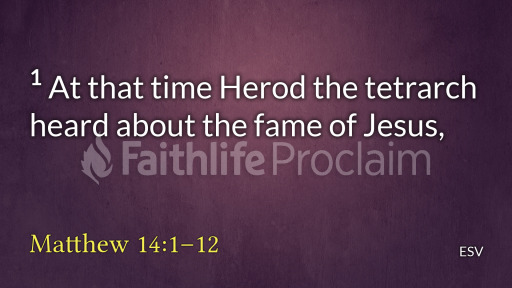The Death of John the Baptist

Notes
Transcript
Sermon Tone Analysis
A
D
F
J
S
Emotion
A
C
T
Language
O
C
E
A
E
Social
Scripture Reading
OpeningPrayer
Introduction
Review/Preview
Begin Expostion
1 At that time Herod the tetrarch heard about the fame of Jesus, 2 and he said to his servants, “This is John the Baptist. He has been raised from the dead; that is why these miraculous powers are at work in him.”
(1)“At that time” explain chronology of Matthew
“Herod the tetrarch”
tetrarch = Ruler of 1/4
AKA Herod Antipas
Son of Herod the great
Technically was “ruler of 1/3” (Split up Herod the Great’s kingdom with Archelaus (ethnarch) ruling Judea, and Herod Phillip (tetrarch).
Antipas rules as Tetrarch of Galilee and Perea
sometimes referred to as a “king”
He heard about the fame of Jesus
Recall some of the miracles done up to this point.
Talk about His fame.
(2) His “servants” is literally “his boys” implying his inner circle.
Herod Antipas has concluded that Jesus must be John the Baptist resurrected.
Why?
It explains, in his mind, how these miracles are happening.
We will get back to this question of why.
Why did Matthew include the story? How does it contribute to his theme? Why does he include the next part?
3 For Herod had seized John and bound him and put him in prison for the sake of Herodias, his brother Philip’s wife,
Herod executed John the Baptist. Why?
Background info
He did this because of Herodias. This lady was a granddaughter of Herod the Great, being the daughter of his son Aristobulus. She married her uncle Herod Philip (who is to be distinguished from the tetrarch Philip, Luke 3:1), who was half brother to Herod Antipas.9 Herod Philip and Herodias had a daughter, Salome. Herod Antipas married a Nabatean princess (whose name is not known), the daughter of King Aretas, but he and Herodias fell in love. They agreed to marry, and Herodias left his half-brother Herod Philip (as Matthew says, she was the wife of his brother Philip; she was also his niece). The daughter of Aretas got wind of what was happening and fled to her father, who promptly went to war with Herod and defeated him (which provoked Roman intervention).10 It was a tangled and complex situation, but what is clear is that the marriage of Herod Antipas and Herodias was contrary to Old Testament law (Lev. 18:16; 20:21).
Leon Morris, The Gospel according to Matthew, The Pillar New Testament Commentary (Grand Rapids, MI; Leicester, England: W.B. Eerdmans; Inter-Varsity Press, 1992), 370.
Explain marriage further...
(3)More history, why did Herod bind and imprison John?
Political/spiritual reasons
Josephus
4 because John had been saying to him, “It is not lawful for you to have her.”
(4) Because what was John doing?
He was calling sin, “sin”
Clear violation to OT law to marry a sister-in-law while the brother was still alive.
5 And though he wanted to put him to death, he feared the people, because they held him to be a prophet.
This is a political/religious situation
People thought he was a prophet
Herod wanted to kill him but didn’t want to make him a martyr
6 But when Herod’s birthday came, the daughter of Herodias danced before the company and pleased Herod, 7 so that he promised with an oath to give her whatever she might ask.
Salome danced and it pleased Herod
speculation
The dance pleased Herod enough that he made an incredible promise.
In Mark we read that the extent of the promise was up to half of the kingdom
We also read there that she consulted with her mother Herodias
8 Prompted by her mother, she said, “Give me the head of John the Baptist here on a platter.”
So what was her request?
She requested for him to do what he was too scared to do…to execute John the Baptist
Beheading was illegal as was execution without a trial
9 And the king was sorry, but because of his oaths and his guests he commanded it to be given. 10 He sent and had John beheaded in the prison, 11 and his head was brought on a platter and given to the girl, and she brought it to her mother.
Herod was the type of ruler who feared being viewed as weak, here, he “was sorry” not that John would die or that he would kill him but that it might cause political turmoil.
Because he made this promise in the public fashion he went with the request.
12 And his disciples came and took the body and buried it, and they went and told Jesus.
John’s disciples buried John and went to tell Jesus
This indicated that John’s disciples recognized Jesus as their new leader.
So… what about those questions?
Why does Matthew include the story of Herod hearing about Jesus’ fame?
Why does he include the history about John the Baptist?
How does this contribute to the overall theme of the book?
All three of these questions are answered in the main idea that...
Jesus is the promised Messiah-King of the Old Testament so believe His message
Jesus is the promised Messiah-King of the Old Testament so believe His message
What do we see about Herod?
Who is he?
His father was Herod the Great
What did he do?
“Like father, like son”
Herod, while not a devout Jew was certainly familiar with the prophecies of the OT
Herod recognized that there was something going on here with these miracles
He got the details wrong
...
So what was Jesus’ message?
It was the same as John’s
Repent for the Kingdom of Heaven is hand (3:2, 4:17)
Repent for the Kingdom of Heaven is hand (3:2, 4:17)
Applications
Many
Gospel is the good news that transforms the world
Bottom up rather than top down.
